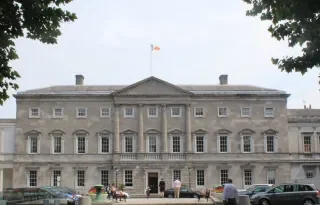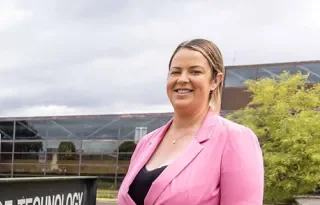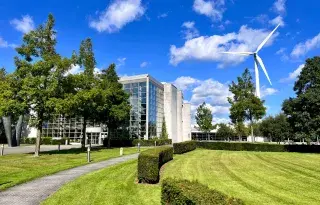DkIT Students Travel to Portugal to Promote STEAM
Recently, a group of Dundalk Institute of Technology (DkIT) students represented the college in Porto, Portugal where they took part in a week long programme of intensive workshops, site visits and then presented their findings to an audience at a conference with the aim of promoting STEAM (Science, Technology, Engineering, Arts, Mathematics). They were also joined by student representatives from third-level colleges in Norway, Belgium and Portugal.
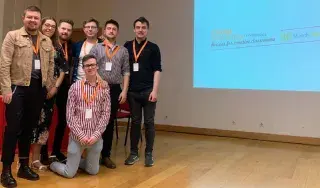
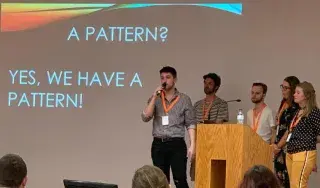
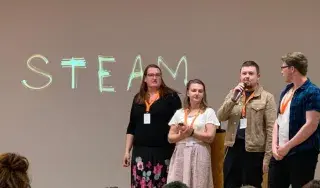
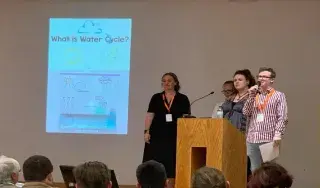
The workshops allowed the audiences mind to be opened up to the wonderful and diverse world of STEAM which aims to eclipse the former STEM (Science, Technology, Engineering, Mathematics) as to place an emphasis on interdisciplinary approaches to education that are valued and brought together rather than divided like elements of STEM. DkIT was graciously hosted in Porto by Luisa Caiano from Curso de Música Silva Monteiro, a music school that has been to the fore in developing STEAM education in Portugal. As with many of the intensive programmes DkIT takes part in, the formal programme began with a series of ice-breaker and creativity exercises led by Luc Celis from Belgium, which was then followed by a very informative lecture from Brazilian astronomer Gustavo Rojas of NUCLIO.
On his experience studying at DkIT Final Year student Calvin McManus noted:
DKIT has brought me to Norway and Portugal where I have participated in workshops using STEAM recipes. Without this experience, I would have never gained the knowledge of teaching children that I have with STEAM education.”
Firstly, the teams reviewed a selection of the STEAM recipes that have been developed over the course of the project and submitted to the Virtual Learning Environment, Moodle. Then each national group led a STEAM workshop – which presented quite different ideas in engaging and enriching ways. Following on, now divided into their transnational groups, the teams took the ideas that were presented and, inspired by the experience of their site visits, they developed a set of workshops to take to three primary schools in the city.
Closing proceedings in their national group were the DkIT contingent of Calvin McManus, Míceál Mullen, Conor Walsh, Ciara Brannigan, Lee Harding, Kevin McGinley, and Michael Waters who quite literally got the audience off their feet with an energetic and enthusiastic song writing workshop with lyrics, rhythm, and melody steeped in STEAM, to the fore. Later in the day the students continued working, now in transnational teams, to develop new workshops that they facilitated in three local schools later in the week.
Final Year student Conor Walsh commented:
I have been incredibly fortunate to have been a part of the STEAM program these past 3 years. As someone who intends on working in the field of education, this trip has opened my eyes to alternative creative ways of teaching. I have also met some life-long friends along the way.”
On Saturday the conference began and students presented the first of their intellectual outputs from the SPACE project. The Neptune App has been developed from an initial concept proposed at Dundalk Institute of Technology in 2016, through development phases with students in Norway and Portugal to realisation here at the conference. DkIT lecturer Dr Ronan Lynch, student Conor Walsh and graduate Michael Waters were part of the presentation team who introduced the delegates, mostly Portuguese teachers, to the app. You can find the app on the project website here. The final round of presentations saw students presenting elements from their recipes in a manner that excited those in attendance. The first group drew inspiration from the Fibonacci sequence and demonstrated how understanding could be developed but also utilised in creative ways, showing in one exercise the development of polyrhythms. The second group demonstrated the water-cycle utilising drama. The third and final group sought to develop classroom ideas on light reminded us of Allan Bloom’s statement that “Education is the Movement from Darkness to Light”.
Finally, a roundtable discussion chaired by DkIT lecturer Dr Daithí Kearney traced some of the processes, successes and future directions of the SPACE project. Michael Waters, a graduate of the BA (Hons) in Applied Music at DkIT who is now working with Junior Einsteins highlighted how his experience with SPACE inspired him to teach and how he has brought his experiences of the project into his work.
Lee Harding, a Year 3 student on the BA (Hons) in Applied Music programme said:
Porto has been an incredible experience for me. Incorporating Science, Technology, Engineering and Mathematics into our Arts based education has really improved my mindset of my future and where I want to go in teaching. It was great to work with students from other countries and gain inspiration from their work as educators, and I have found benefit in learning from them as well as redefining my skills so that I could also impart some knowledge into their work. Working with children who do not speak English is an experience I will take with me as a moment where I know I'm working in the right field.”
Relevant Links:
